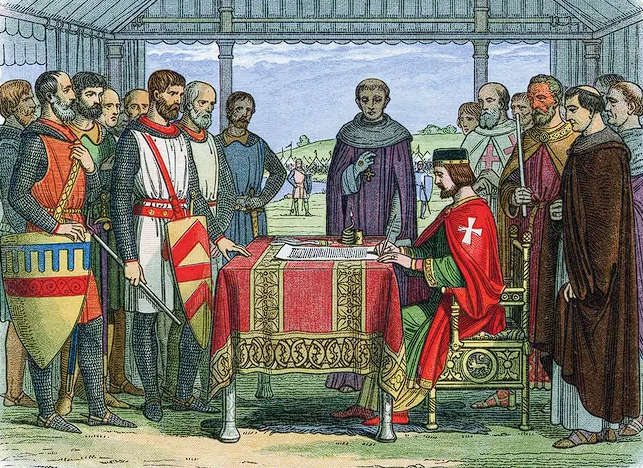On this day, June 16th, in the year 1215, a unique moment unfolded on the plains of Runnymede in England. A King, known for his unpredictable temperament and controversial rule, yielded to the demands of his barons, placing his seal on a document that would become the beacon of justice, law, and human rights. This King was John, younger brother of Richard the Lionheart, and the document was the Magna Carta. Its influence on societal structure, consent culture, and societal change is profound and enduring.

King John was not always destined to wear the crown. As the fifth son of Henry II, his prospects of succeeding the throne were slim. This is why he was initially nicknamed “John Lackland”, as he had little expectation of inheriting significant land. However, a combination of fate and familial discord led to his unlikely ascension.
His elder brother, Richard I, better known as Richard the Lionheart, overshadowed John. Richard was a military leader, charismatic and courageous, often held up as an ideal medieval king. His exploits during the Third Crusade led to his moniker, and he was largely popular among his subjects.
When Richard left for the Crusades, he nominated John as his successor should he not return. Richard’s absence became a turning point for John, who began to consolidate power. Upon Richard’s death in 1199, John took the throne.
The contrast between the brothers was stark. While Richard was renowned for his gallantry, John was often criticized for his capriciousness, harsh taxation policies, and failed military campaigns. He was unpopular, leading to the baronial rebellion and the subsequent creation of the Magna Carta.
The character of King John has been further cemented in popular culture through the legend of Robin Hood. In these tales, John is often portrayed as the villainous king, a usurper ruling in Richard’s absence, oppressing the poor and challenging the ideal of the benevolent King Richard. Whether entirely historically accurate or not, these stories emphasize John’s role in exacerbating societal tension.
What connects King John, the Magna Carta, and the legends of Richard and Robin Hood to the theme of consent culture and societal change?
King John, despite his flaws, was a catalyst for change. His reign, marked by dissent and discontent, led to the creation of the Magna Carta. This historic moment signaled a shift away from absolute power and towards the requirement of mutual agreement and consultation.
The legend of Robin Hood, too, ties into this narrative. It tells the story of resistance to oppression, embodying the struggle for fairness and justice, reflecting the cry for respect, rights, and consent that led to the Magna Carta.
The stories of King John, Richard the Lionheart, and Robin Hood, each in their own way, contribute to the narrative of consent culture and societal change. The heroes and villains of history and legend often embody our struggles and aspirations. In the journey towards a society that values and prioritizes consent, we may see echoes of Robin Hood’s resistance to injustice, the barons’ demand for rights from King John, and the spirit of fairness associated with Richard the Lionheart.
As we remember the signing of the Magna Carta today, we can see the enduring potential of progressive thought and societal evolution. The echoes of a charter from 1215 continue to influence our world, reminding us of the power of change and the importance of consent – in history, in legend, and in our lives today.
Comments are closed